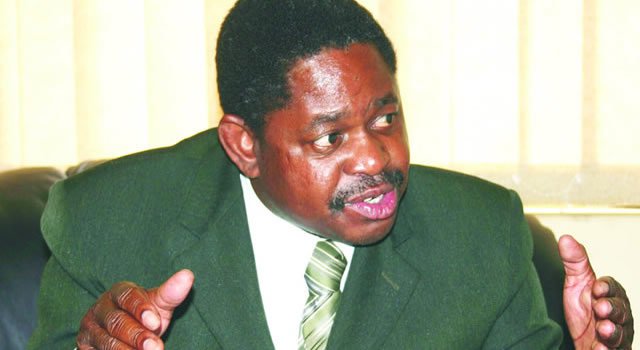HARARE – Former Cabinet minister, Paul Mangwana, has been caught up in a tender storm after his law firm was engaged by several municipalities to collect outstanding debts owed by ratepayers under unclear circumstances.

A former Member of Parliament for Chivi who co-chaired the Constitution Parliamentary Select Committee (COPAC) that crafted the new Constitution, Mangwana’s legal practice was given the mandate to recover money owed by residents of Harare, Karoi and Kadoma in water and rates.
Harare alone is owed over US$350 million while residents of Karoi are indebted to the tune of over US$2 million. As of March 2014, Kadoma was owed in excess of US$8 million.
The city fathers of Kadoma have recovered nearly US$3 million, while efforts are underway in Harare and Karoi to recover the debt.
Residents have been battling to honour their dues owing to the deteriorating economic situation, characterised by company closures and widespread job losses.
Regardless, councils have been breathing hard down residents’ necks to enable them to provide essential services, which require heavy financing. Mangwana Legal Practitioners is currently in the process of distributing letters of demand to residents in Harare and Karoi.
The practice is said to be charging US$4 for every letter delivered. Residents in the three cities have raised eyebrows over the manner in which the law firm was roped in to recover the debts. It is not clear as yet whether the city fathers in the three municipalities went to tender before settling on the law firm.
In terms of the Urban Councils Act, all projects must be awarded after going through tender. Section 210 of the Act states that a municipal council shall not procure any goods, materials or services unless its municipal procurement board has made recommendations to the council thereon and the council has considered such recommendations.
Under Section 211, a municipal procurement board is defined as a panel appointed by council in terms of Section 210. Minutes of a full council meeting held in Karoi seem to suggest that Mangwana could have canvassed for the job.
He was introduced to councillors on May 26, 2015 at a finance and investments committee meeting during which he briefly outlined his resume (which dates back to 1986), experience and business. He also presented his charges, after which he left the meeting.
Councillors present immediately questioned Mangwana’s involvement in debt collection when there was another law firm, Masawi and Partners, which had already been engaged by the municipality to do the same.
They also expressed concern over the lack of transparency in the whole deal. Mangwana once worked as the town’s legal advisor.
“Councilor Matsika expressed disgruntlement in the lack of communication as councillors needed to be informed in advance about any guest who would be coming before the committee. Councilor Jena concurred and added that there was need for councillors to do research so that they would be able to ask questions.
“Councilor Matekenya bemoaned the lack of adherence to council standing orders. Councillor Jena highlighted that there was need to have a special full council meeting so as to discuss the issue since council already had two lawyers,” reads part of the minutes.
Section 211 (6) (ii) of the Urban Council Act indicates that “the tender of any person who canvasses or solicits or causes to be canvassed or solicited the support of the mayor, any councilor or employee of the council or any number of municipal procurement board in support of his tender shall not be considered”.
Mangwana this week refused to say whether his company had won the mandate through tender citing professional reasons.
“I am working as a professional and that means I cannot disclose much about my clients otherwise I can be struck off the register by the Law Society of Zimbabwe (LSZ) for breaching lawyer client confidentiality principal,” he said.
“I am sorry because I am not at liberty to talk to the media about this. I am acting as a professional and not a politician. The truth of the matter is that I am working with many local authorities in the country”.
The LSZ’s primary function is to promote study of the law; control the admission of new members and regulate the profession in respect of continuing training, discipline and trust accounts.
Born in August 1961, Mangwana previously served as deputy minister of transport and communications before being appointed minister of State for State enterprises and parastatals in August 2002.
He was subsequently appointed as minister of labour and social welfare in February 2004 and later served as acting minister of information before being appointed as minister of indigenisation and empowerment in February 2007.
He was one of the co-chairpersons of COPAC, which was instrumental in crafting the new supreme law of the land, which was one of the major deliverable of the inclusive government which governed Zimbabwe between 2009 and 2013.
Harare Residents Trust (HRT) director, Precious Shumba, said city fathers in the capital city owe residents an explanation. He said the involvement of a debt collector was an additional burden to residents who have to also pay the debt collector on top of clearing their obligations.
“The HRT is unaware of any tendering process for the debt collection services. The involvement of debt collectors is a clear demonstration that the Harare City Council (HCC) has no capacity to enforce municipal regulations and by-laws when it comes to debts owed by residents,” he said.
“While the chamber secretary (Josephine Ncube), who is the acting Town Clerk, is a lawyer, the whole council management is being driven to these extreme measures in order to raise more money for the council against a collapsing service delivery system, and a bloated workforce. They need to raise more money for salaries, which consume plus 85 percent of all revenue generated by council every month,” said Shumba.
HCC spokesperson Michael Chideme had not responded to enquiries from the Financial Gazette at the time of going to print. Financial Gazette






